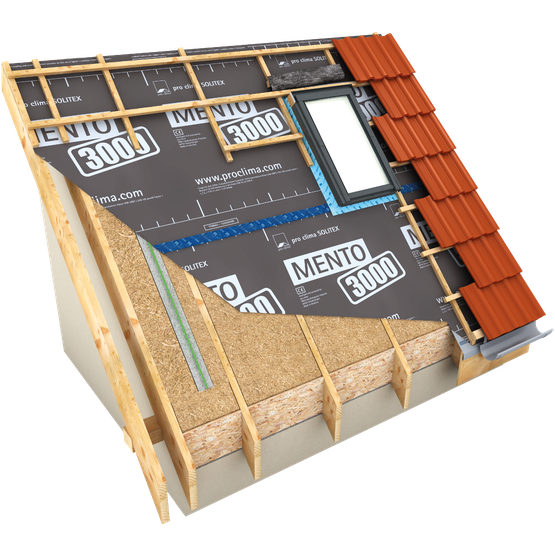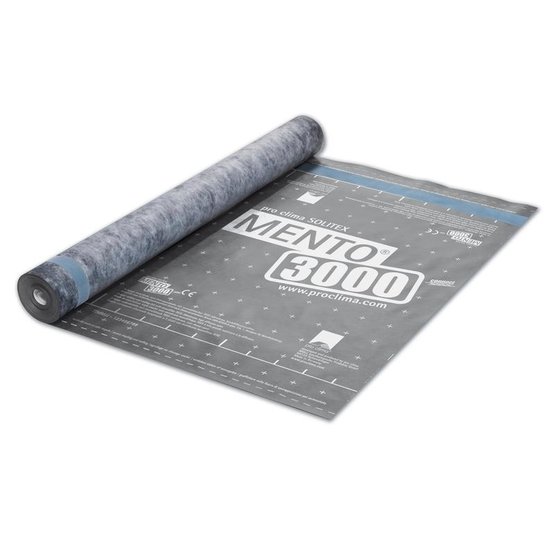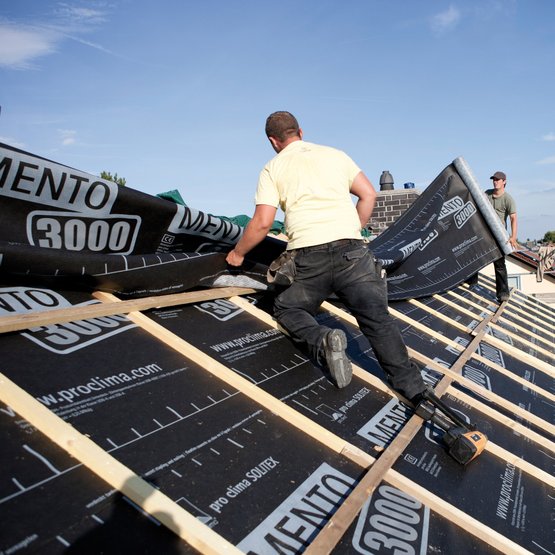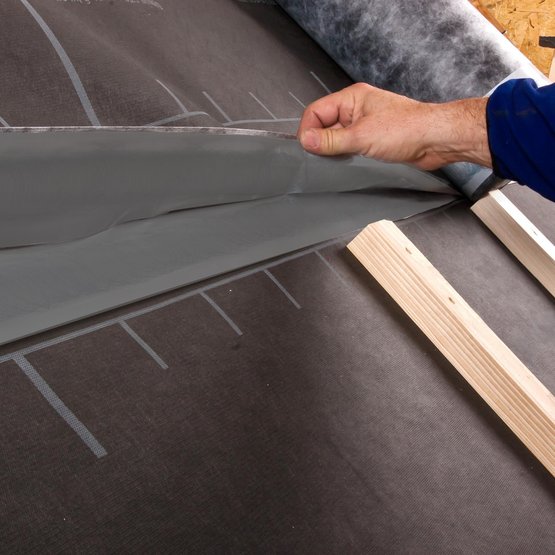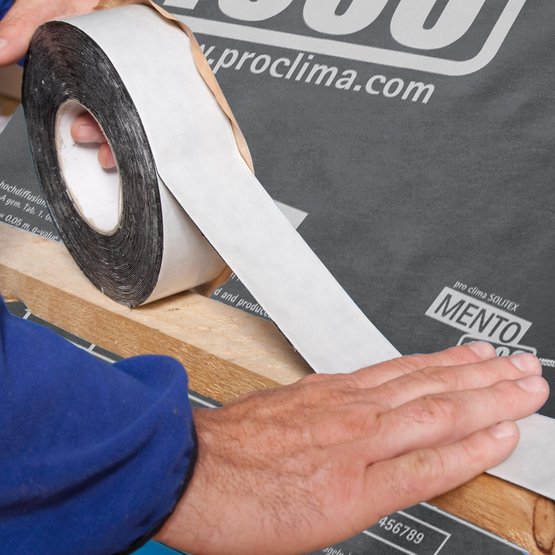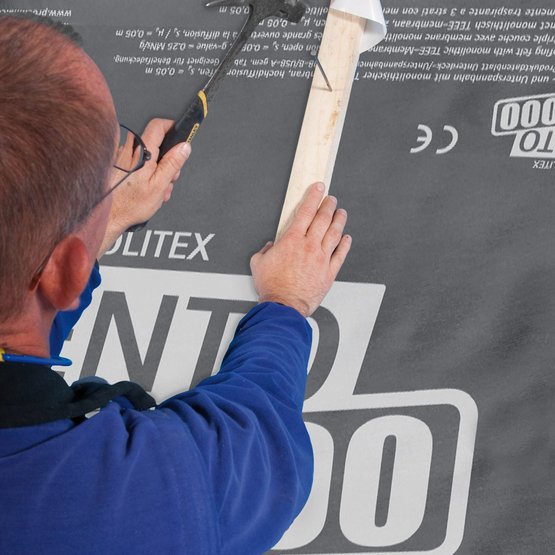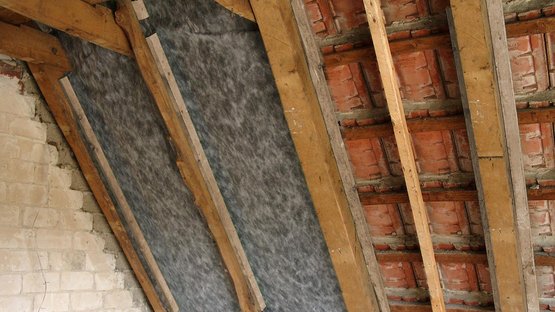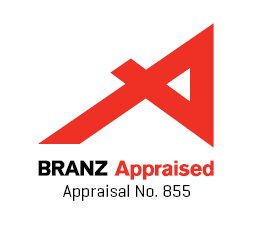Roof Weather Resistive Barrier with Self-Adhesive Strips
Advantages
- Excellent UV resistance
- Highly vapour-permeable (Class 4)
- Long-term durability and high strength
- Weathertight & airtight weather-resistive barrier (WRB)
- Helps protect a building from condensation
- connect technology comes with two integrated self-adhesive strips
Areas of application
SOLITEX MENTO® 3000 connect provides superior weather and condensation protection for your roof under all weather conditions . With type R4 classification (NZS 2295), it is suitable to be used in self-supported applications up to and including extra high wind zones . SOLITEX MENTO® protects your roof and building envelope from the elements during construction while allowing any internal moisture to escape through the vapour permeable, non-porous TEEE layer.
SOLITEX MENTO® 3000 connect uses connect technology and has two integrated self-adhesive strips for easy installation.
Installation instructions
General conditions
IMPORTANT INFORMATION
- This product is a Class 4 vapour-permeable pliable building underlay in accordance with NZS 2295 and AS 4200.1.
- This product is designed to withstand up to 90 days of UV exposure before cladding is installed.
- This product can withstand temperatures up to 120 °C and down to -40 °C behind external claddings.
- The SOLITEX MENTO® 3000 connect has two integrated self-adhesive strips for easy installation
PRODUCT DESCRIPTION
SOLITEX MENTO® 3000 connect is a UV-stabilised and tear-resistant synthetic weather-resistive barrier (WRB) for roofs. A non-porous water-resistant TEEE film is laminated at high temperatures between two layers of spun-bonded polypropylene (PP). SOLITEX MENTO® 3000 connect comes with two integrated self-adhesive strips.
WEATHER EXPOSURE
This product is a weather-resistive barrier (WRB) designed to withstand up to 90 days of direct UV exposure and still fulfil its intended use for wind and water control. Exterior cladding should be detailed to prevent direct sunlight from reaching the membrane in service.
APPLICATION NOTES
This product is suitable for use in accordance with BRANZ appraisal 855 as an alternative to conventional kraft paper roof underlays or in accordance with the approved Pro Clima installation method, which uses counter battens and above underlay ventilation. SOLITEX MENTO 3000 connect is recommended for optimum weatherproof joints on roof pitches below 15 degrees.
SOLITEX MENTO® system - Retrofitting roofing underlay from the inside
In cases where there is no roofing underlay present, non-porous underlay can be retrofitted from the inside using one of the SOLITEX roofing underlays. SOLITEX membranes are equipped with a monolithic, non-porous functional film. As a result, they are watertight against water from the outside and can actively transport moisture vapour from the building structure into the open at the same time. This ensures optimal protection for the insulation structure.
Advantages
- Well-protected building structures: highly diffusion-open and maximum protection against driving rain
- Dry building structures: non-porous TEEE functional film actively transports moisture to the outside
- Long-term protection thanks to the high resistance to ageing and heat of the TEEE functional film
Reliable system for installation from the inside
The roof pitch of the roof tiles must not be less than the standard roof pitch. The roof pitch must be at least 20°. Installation is carried out from the inside, proceeding in turn from one space between rafters to the next. Battens at the corners of the rafters/tile battens provide the necessary ventilation for the roof covering. A ‘protruding lath’ fitted in the middle of the space between rafters forms a valley in the SOLITEX membrane. In this way, any water that has entered can be drained off to the middle of the area between the rafters (away from the rafters) and towards the eaves.
Attach the SOLITEX membrane to the rafters using battens or DASATOP FIX. The membranes must be overlapped in a waterproof manner and must drain reliably into the open. Installing from top down is easier to achieve the correct overlap.


